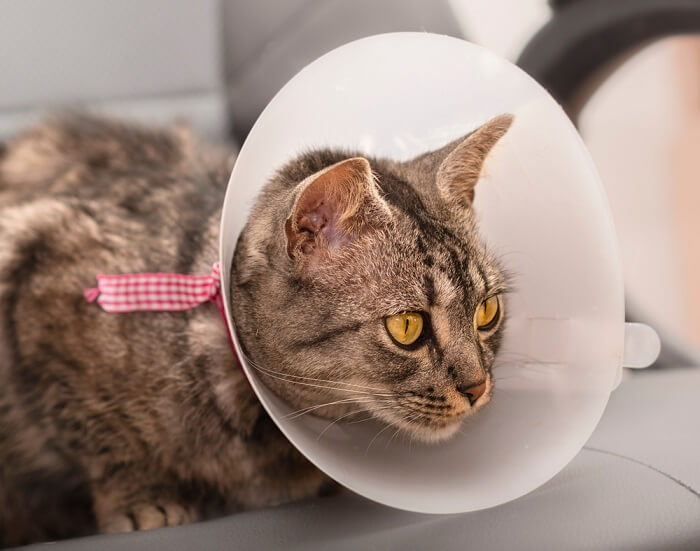Recognizing Cat Poisoning: Symptoms, and Treatment (original) (raw)

Just like humans, cats can come into contact with toxic substances that are hazardous to their health.
Cats encounter poisonous substances by swallowing them, chewing on them, inhaling them, or coming into physical contact by brushing against or walking through them. When dealing with suspected poisoning in cats, it is important to recognize the signs of poisoning and know what to do if you see them.
Quick Overview: Poisoning In Cats





What Causes Poisoning in Cats?
Many substances can cause poisoning in cats. Some of the most common causes of cat poisoning include:
- Poisonous plants such as lilies (day, tiger, japanese show), tulips, and rhododendrons, azaleas
- Ingesting or physical contact with common household products like bleach, disinfectants, and other cleaning products, antifreeze, insecticides, pesticides, and rodenticides (rat poison)
- Common drugs like Ibuprofen, acetaminophen (also called paracetamol), antidepressants, cannabis products, and over-the-counter non-steroidal anti-inflammatory painkillers
- Topical insecticides designed to kill fleas and ticks and all products containing permethrin
- Ingestion of human foods, especially anything that contains xylitol, garlic, onions, alcohol, chocolate, black tea, coffee, excessive levels of fat, raw fish, grapes, and raisins, or any other dried fruit
Poisoning in cats is a serious problem.
While poisoning in cats is no more common than poisoning in dogs, it can often result in more severe symptoms.
This is due to several factors, including:
- Their relatively small size. Even small doses of toxins can be poisonous in small animals. Kittens are at even higher risk because they are so small.
- Cats metabolize chemicals differently than dogs, which can make it more difficult or even impossible to eliminate the toxic substance from their body.
- Many cats live unsupervised and outdoors, where they can come into contact with toxic substances. Many pet parents don’t even realize their cat has been poisoned because they didn’t see their cat come into contact with the toxic substance.
- Cats lick themselves to groom, and accidentally ingesting a substance while grooming is a common cause of poisoning in cats.
Symptoms of Poisoning in Cats

The symptoms of poisoning in cats differ depending on the substance that caused the poisoning, but there are a few key signs to look for.
The signs of poisoning in cats vary dramatically depending on what toxin the cat has been exposed to, the overall health of the cat, how the cat was exposed (ingestion, inhalation, etc.), how long ago the exposure happened, and the amount of poison exposed to the cat.
Cats are masters at hiding illness, and in mild cases, you may not notice any symptoms at all. Poisoning affects the whole body, but the most common body systems affected include the gastrointestinal system, the skin, the kidneys, the liver, and the nervous system.
Typically, if signs of poisoning are going to show up they tend to occur all of a sudden, i.e. the cat was fine and now he is not, however, in some cases, the response can be delayed 24 hours or longer.
The most common signs of poisoning in cats include:
- Vomiting
- Drooling
- Diarrhea
- Difficulty breathing
- Lethargy or weakness, wobbly gait
- Unresponsive
- Tremors, seizures, or twitching
- Appetite loss
- Drinking more than normal or excessive urination
- Red or raw skin or paw pads due to a chemical burn
- Bloody vomit, saliva, and/or stools
- Pale gums
- Excessive sneezing
- Hiding or decreased social behavior
- Yellowish tint to skin and whites of eyes (jaundice)
- Racing heartrate or excessively slow heartrate (resting normal heartrate in cats is 130-150 beats per minute)
What Should I Do if I Suspect My Cat Has Been Poisoned?
If you suspect that your cat has been poisoned do not wait: call your local veterinarian during normal business hours or your local emergency veterinary hospital.
Many people will wait until their cat shows signs of sickness, but if you know your cat has been exposed to a toxin, or if your cat is showing any signs of poisoning, the best thing you can do is call your vet immediately.
Also Read: 11 Signs That You Need to Get Your Cat To the Emergency Room
The reason for this is your vet may be able to safely remove the toxic substance from your cat’s body, thus avoiding the signs of poisoning altogether. If you don’t have access to a local veterinarian, call the pet poison helpline or your local poison control.
If you know what your cat has been exposed to, bring a sample of it or a picture of it with you to the vet. Make sure to include the ingredient label if applicable. This is important because it will give your vet the information she needs to possibly save your cat’s life.
Even if you have googled and know how to induce vomiting in your cat, never induce vomiting in a cat without the supervision of a veterinarian or poison expert, either in person or over the phone. Some substances, such as bleach, can burn the esophagus in a cat that has been induced to vomit, and inducing vomiting is not the right choice in all cases of poisoning.
Can Cats Recover From the Signs of Poisoning?

With the right treatment, most cats can recover from poisoning and go on to lead healthy lives.
In most cases, cats can recover without incident from poisoning and go on to live long, normal, healthy lives. In other cases, such as cats that develop kidney failure from ingesting lilies or ethylene glycol in antifreeze, there may be permanent damage to internal organs from the poisoning.
If your cat ever comes into contact with a poison, seeking prompt veterinary attention is your best bet and helping your cat recover quickly without long-term problems.
How To Prevent Poisoning in Cats
The best medicine is preventive medicine. Here are some tips on how to keep your cat safe:
- Keep your cat indoors. If your cat likes the outdoors, take your cat out on a leash or keep your cat secured in a safe space, like a Catio.
- Make sure your cat is protected from toxic substances by keeping all potentially toxic substances in your home, including chemical, insecticides, pesticides, locked away out of reach of animals.
- Check your yard for toxic plants, and bar your cat’s access to these plants.
- Keep all over-the-counter and prescription medicine and supplements in a closed cabinet.
- Avoid using over-the-counter flea treatments, flea collars, and sprays that contain permethrins on your cat. Permethrins are extremely toxic to cats.
By educating yourself about what is not safe for your cat, and making mindful changes in your environment to keep your cat away from these substances, you and will protect your cat from accidental poisoning. Who knows – you may even save a friend’s cat’s life as well.
Also Read: Plants Poisonous to Cats: Toxic Plants to Avoid
Frequently Asked Questions
How do I know if my cat has been poisoned?
The signs of poisoning in cats vary dramatically depending on what toxin the cat has been exposed to, the overall health of the cat, how the cat was exposed (ingestion, inhalation, etc.), how long ago the exposure happened, and the amount of poison ingested or otherwise exposed. Cats are masters at hiding illness, and in mild cases, you may not notice any symptoms at all. Poisoning affects the whole body, but the most common body systems affected include the gastrointestinal system, the skin, the kidneys, the liver, and the neurological system.
Typically, if signs of poisoning are going to show up they tend to occur all of a sudden, i.e. the cat was fine and now he is not, however, in some cases, the response can be delayed 24 hours or longer. The most common signs of poisoning in cats include:
- Vomiting
- Drooling
- Diarrhoea
- Difficulty breathing
- Lethargy or weakness, wobbly gait
- Unresponsive
- Tremors, seizures, or twitching
- Appetite loss
- Drinking more than normal or excessive urination
- Red or raw skin or paw pads due to a chemical burn
- Bloody vomit, saliva, and/or stools
- Pale gums
- Excessive sneezing
- Hiding or decreased social behavior
- Yellowish tint to skin and whites of eyes (jaundice)
- Racing heartrate or excessively slow heartrate (resting normal heartrate in cats is 130-150 beats per minute)
If you notice any of these symptoms, call your veterinarian, a veterinary emergency clinic, or if neither are available, the ASPCA 24 hour poison hotline.
Can cats recover from poisoning on their own?
Whether or not a cat can recover from poisoning without veterinary treatment depends on the overall health of the cat, the amount of toxic substance the the cat was exposed to, and the type of poison. Most of the time, it is still a very good idea to call your vet for advice. If your cat is showing any signs of poisoning, then call your vet immediately.
How do you save a poisoned cat?
The best thing to do if your suspect your cat has been poisoned is to call your local veterinarian, a local veterinary emergency clinic, or the pet poison hotline at (888) 426-4435 immediately.
Make sure your cat is in a safe place, and remove any access to toxins. Save the toxic substance or make a note of what you think your cat was exposed to so that you can relay that information to your veterinarian.
Do not induce vomiting or start any other at home medical treatment in your cat without the supervision of a veterinarian.